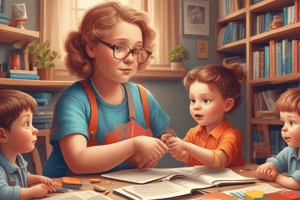Podcast
Questions and Answers
According to Jean Piaget, what do schemas do?
According to Jean Piaget, what do schemas do?
- Provide complex actions
- Organize the past experiences
- Repeat some schema
- Act as the basic units of information (correct)
How does Piaget believe cognitive development is formed?
How does Piaget believe cognitive development is formed?
- Through reflex actions
- Through the stages of development
- Through experience (correct)
- Through the thinking of adults
What is an operation or mental process?
What is an operation or mental process?
- A stage of development
- A general concept
- A schema
- A repetition of a schema (correct)
Flashcards are hidden until you start studying
Study Notes
- Jean Piaget's theory of cognitive development states that a newborn passes through the stage of reflex actions and then reaches a stage where it can perform complex actions like an adult.
- Piaget maintains that the stages of development have continuity and that the individual goes through the stages of development one at a time just like a butterfly.
- The thinking of children is different from that of adults because the child is at a different stage of development. However, the child is not an idiot.
- Piaget believes that cognitive development is based on experience and that schemas are the basic units of our information.
- Schemas are the general concepts that are based on experience and organize the past experiences. They also build the structures of cognition.
- When the child is able to repeat some schema in its mind, it is called operation or mental process.
Studying That Suits You
Use AI to generate personalized quizzes and flashcards to suit your learning preferences.




